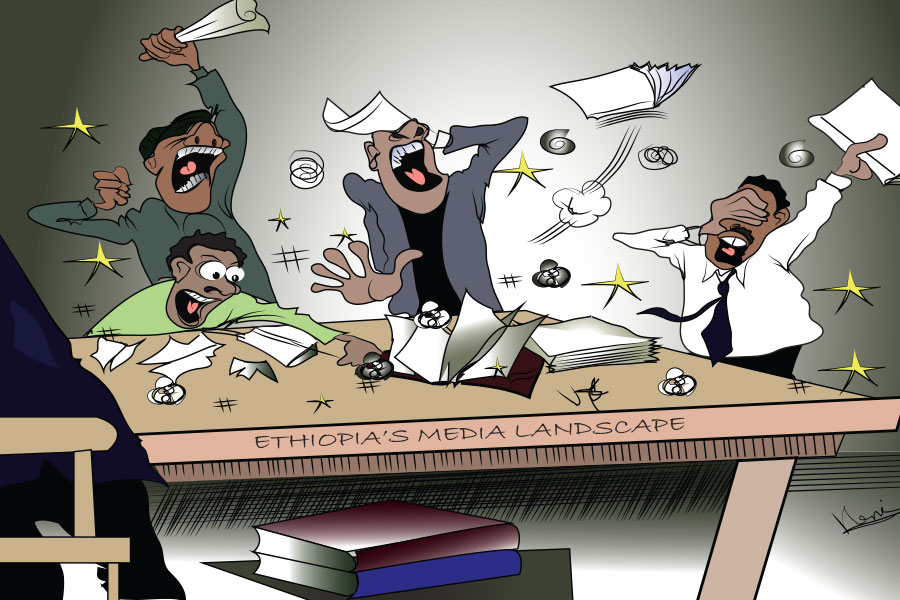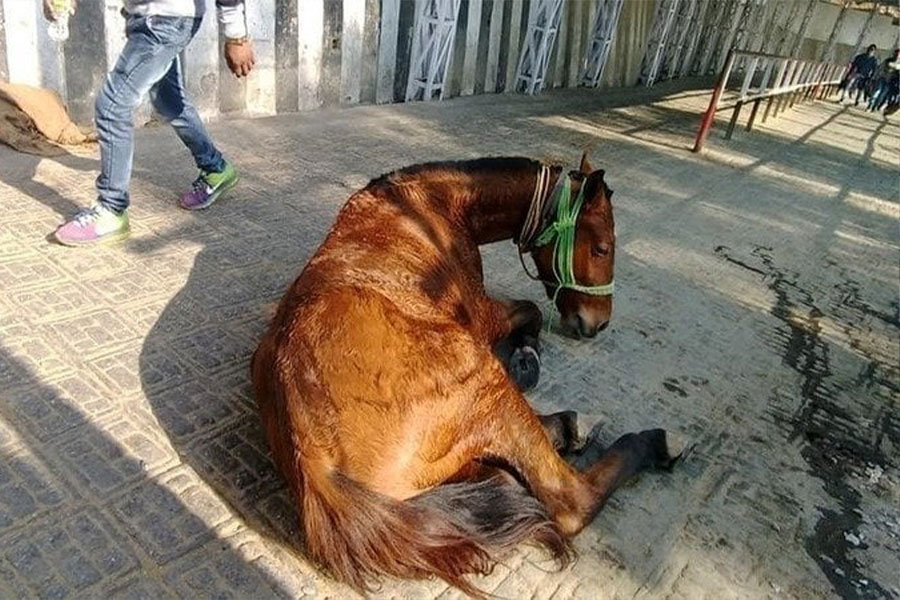
Films Review | Nov 09,2019
Jun 27 , 2020.
In the popular imagination, Ethiopia's current federal organisation was the brainchild of leaders of an assortment of highly ideological liberation movements whose prime objective it was to reject the prevailing socio-political construction. It is the view at least in some quarters of the political aisle.
But the importance of instituting a political system that expresses the country's socio-cultural diversity dates back to at least the military-Marxist regime, which established the Institute for the Study of Ethiopian Nationalities, in the early 1980s. Many of its experts went on to advise on the drafting of the 1987 Constitution - through a commission established a year earlier - culminating in studies on the question of "nations and nationalities." What the Institute had to offer was, nonetheless, given little heed by the military government which was uninterested in sharing political power.
Notable is how even a regime strongly vested in maintaining a unitary state realised that the quest for self-determination by lingo-cultural groups had to be addressed. It was an aspiration initially ignited by the student movement of the late 1960s and early 1970s. To this day, it remains a significant issue of political power contention.
Even the successors of the military government, the EPRDFites, seemingly conscious of the Gramscian conception of cultural hegemony, failed to live up to the expectations they set before them. They oversaw the drafting of Ethiopia's most radical Constitution, ratified in 1995.
It instituted a federal system, which took input from studies such as the one carried out by the Institute, arranged along lingo-cultural fault lines. More importantly, it identified "nations, nationalities and peoples" as sovereign, which exercise their rights through their representatives, and a right to self-determination for any community of people that ask for it.
Like that, Ethiopia became not a nation-state - or a confederacy because of the relatively wide range of powers afforded to the federal government - but a multi-national state.
The fight over a state for a nation has been on the retreat since, given way to forces that fight for nations for a state.
Ironically, the EPRDFites were not as restrained in their exercise of power as they imagined anyone controlling the federal government should be under the Constitution. On the surface, there was a country with carefully delineated powers shared, not devolved, between the federal and regional governments. Below the surface though, it was a state where political power was centralised through a party structure, informed by a Maoist tradition of democratic-centralism.
The Prosperity Party inherited this inherent contradiction. And it has a leader under Abiy Ahmed whose ambition appears to be driving in the reverse gear of redrawing the political discourse. He seems to be determined to fight for a state which can have a nation. Contrary to the EPRDF mantra of "multi-national unity," his is "Hibre-Hagerawiunity," the latter an oxymoron to say pan-nationalist unity. In the semantics lies a full cleavage of views on how the Ethiopian state should be constructed and reconstructed.
Most importantly, Abiy and his political allies - having ridden a wave of protests against, at least in part, a lack of representation - were faced by "nations, nationalities and peoples" that had been waiting their due constitutional right to statehood for the past quarter of a century. The epicentre of these demands for statehood has been the Southern Nations, Nationalities and People's Region (SNNPR), the most diverse multi-cultural state in Ethiopia for representing 56pc of lingo-cultural groups.
It was in this region that calls for statehood have been loudest. Over the past two years, 10 of the 11 zones have demanded statehood status through their respective councils. With the success of the Sidama Zone in becoming a Regional State, the demands are bound to be more durable.
Chief among these, by virtue of the steps it has already taken to realise statehood, is the Welayta Zone, which through its Council established an office that oversees the preparation of a regional flag and the drafting of a Constitution. It was a decision that came as the relationship between the regional government and the Zone's Council became heated.
Representatives of the Zone had withdrawn themselves from the Regional State's Council earlier this month in protest against the suggested reorganisation of the Southern Region into four as not a satisfactory enough response. With a formal letter having been sent from the Welayta Zone Council to the Regional State, a referendum to decide upon statehood is yet to take place.
These are demands that are unlikely to abate, especially following the results of the outcomes of Sidama Zone's quest for statehood. With the formal transfer of power between the regional government and the new Sidama State having taken place, momentum for a major reorganisation of the Southern State has been set.
Unfortunately, what the bid for statehood has demonstrated is that the administration of Prime Minister Abiy prefers to see what is at least a carefully shepherded process to statehood. It was a long and combative process the Sidama Zone had to go through to become a Regional State, which was an effort that could have been expended more constructively to agree on details such as border delineation, budget and asset-related matters.
It was a failing on the part of the Prime Minister's administration that statehood questions could not be approached with a sense of goodwill instead of, at worst, hostility and, at best, detachment. They are legitimate constitutional issues and a healthy exercise of the right to self-determination that require reasoned discourse and a proper response.
The concern from encouraging demands for statehood is understandable. There exists a legitimate fear that such trends encourage and reinforce the centrifugal forces within the Ethiopian state, endangering stability and the viability of the state. But state disintegration was arguably a far bigger threat in most of the latter half of the 20th century when Ethiopia was a unitary state. No less than 27 unitary states formed in the world since 1945 have come to collapse, a far cry compared to only four countries formed under multi-cultural (ethnic) federalism, and five others which had mixed federalism with a unitary form.
Heterogeneous societies do not lend themselves smoothly to national cohesion; that much is taken for granted. But lingo-cultural diversity is not a core cause for a state's collapse. It is instead the diverging conceptions of the character of the state, which heterogeneity can only add fire to when the various groups are not afforded political representation and economic equity within the polity. When this occurs, they resort to rejecting the state.
There is another argument, though flawed, against demands for statehood: it poses an administrative headache. Many regional states do indeed mean more paperwork, civil servants and government offices which cost money and further layers of bureaucracy.
But the protection of the rights of citizens was never going to be cheap. If there is an agreement that any cultural and political community has the right not only to preserve and protect its identities but a right to choose its sovereignty, then this is the necessary cost for the country to pay. If one of the essential grounds for the existence of a state is the administration of justice, then it should not be baulked at when it needs to invest resources to meet these demands.
Does it mean that federalism - and Ethiopia's federalism in its current conception - is an infallible system for the political organisation of the Ethiopian state?
Certainly, it should not be. The ease with which centrifugal impulses could be provoked and incensed by political elites for their bids for power is worrying. But the response cannot be to frustrate such a right to self-determination - this would be throwing out the baby with the bathwater.
The rational response could be to double-down on federalism and multi-party democracy, both of which went unrealised even by a regime that preached their importance. The multi-national character of the state ensures the right to sovereign choices by the "nations, nationalities and peoples" and provides a check on the power of the federal government.
A pluralistic democracy nurtures the competition of ideas. It is crucial to allow the voices of minorities within regional states to be heard as well as for the development of an uncoerced and healthy sense of collective destiny and national consciousness.
Allowed to continue with the current internal contradictions of a multi-national state in theory but a de facto unitary state in practice, where power is dispensed from the centre, stability will continue to be at stake. But a federal structure that respects and fosters democratic contestation for political power is the most persuasive case for the preservation of the Republic.
PUBLISHED ON
Jun 27,2020 [ VOL
21 , NO
1052]

Films Review | Nov 09,2019

Commentaries | Jan 07,2024

Editorial | Mar 16,2019

Viewpoints | Sep 27,2025

Sunday with Eden | Jun 05,2021

My Opinion | Nov 26,2022

Fortune News | Oct 15,2022

Commentaries | Nov 20,2021

View From Arada | May 24,2025

Life Matters | Jun 13,2020

Photo Gallery | 180591 Views | May 06,2019

Photo Gallery | 170786 Views | Apr 26,2019

Photo Gallery | 161867 Views | Oct 06,2021

My Opinion | 137296 Views | Aug 14,2021

Dec 22 , 2024 . By TIZITA SHEWAFERAW
Charged with transforming colossal state-owned enterprises into modern and competitiv...

Aug 18 , 2024 . By AKSAH ITALO
Although predictable Yonas Zerihun's job in the ride-hailing service is not immune to...

Jul 28 , 2024 . By TIZITA SHEWAFERAW
Unhabitual, perhaps too many, Samuel Gebreyohannes, 38, used to occasionally enjoy a couple of beers at breakfast. However, he recently swit...

Jul 13 , 2024 . By AKSAH ITALO
Investors who rely on tractors, trucks, and field vehicles for commuting, transporting commodities, and f...

Nov 2 , 2025
The National Bank of Ethiopia (NBE) has scrapped the credit-growth ceiling that had s...

Nov 2 , 2025 . By SURAFEL MULUGETA
The burgeoning data mining industry is struggling with mounting concerns following th...

Nov 2 , 2025 . By YITBAREK GETACHEW
Berhan Bank has chosen a different route in its pursuit of a new headquarters, opting for a transitional building instea...

Nov 2 , 2025 . By BEZAWIT HULUAGER
Nib International Bank S.C. has found itself at the epicentre of a severe governance...